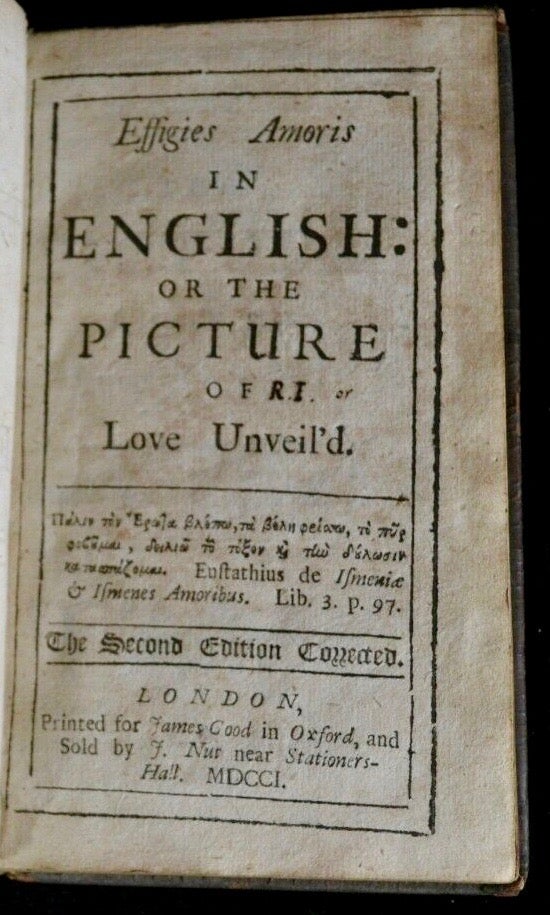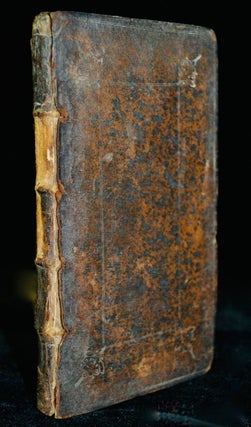Effigies amoris in English: or the picture of love unveil’d.
Oxford: London : Printed for James Good in Oxford, and sold by J. Nut [i.e. Nutt, London], 1701. Second edition of the English translation by John Norton. ¶ Duodecimo; A-E12, F11 (A1, half title, present) Bound in original full calf, missing some leather from spine but cords are very strong. Some wonderful quotes for this book:
The Answer of R. W. to his Friend, importunately desiring to know what LOVE might be?
I Acknowledge the wanton Ty∣ranny of imperious Love, that is always requiring the most diffi∣cult Trials of the Affections. Now though it be a kinde of an Hercu∣lean Labour it self to Love, considering those severe duties, those toyls, and hazards appendant to it; as if Cruelty were its sole delight: Nevertheless we believe it reasonable, what names so∣ever we have given to Love, that he should exercise his Soveraignty, which is certainly very great and puissant; and by the Severity of his Commands, that he should augment the glory of his high Rule, and our obedient Sub∣mission.
“However, this is the supreme Office of Reason, to make a right choice of Disposition and Conditions; to choose a Companion with whom we are sure to live with more delight than with our selves; whose judgment we may be sure to follow as our own: or else to stay till we can finde a proper Ob∣ject of Love. Then also so to love, like one who is guided by Judgment, not carried away by Passion; like one so far from ceasing, that he is always beginning to Love. This is to joyn Patience with Constancy. This is to receive the Idea more fairly imprinted in the Minde, than in Wax, and to preserve more stedfastly. 'Tis the Of∣fice of Vertue, to determine upon one measure of wishing; to covet a dispo∣sition and inclination like his own, through all the changes of Fortune; and so to make two of one, that they may act the same person.”. ESTC Citation No. N1243
415J. Item #779
The “Amoris Effigies (anon.), London, 1649, 1664, 1668, 1671. In 1680 appeared a loose English translation, by a Robert Nightingale, which deviated in many points from the Latin original. John Norris, under the pseudonym Phil-iconerus, published a fresh translation, London, 1682; 2nd edit., 1701; In his introduction, Norris wrote of Waring's "sweetness of fancy, neatness of style, and lusciousness of hidden sense".
Waring also wrote Latin verses, including in Jonsonus Virbius [playwright Ben Jonson.](1639), reprinted in the 1668 and subsequent editions of the Amoris Effigies, under the title of Carmen Lapidorium.” (DNB).
Price: $2,200.00


